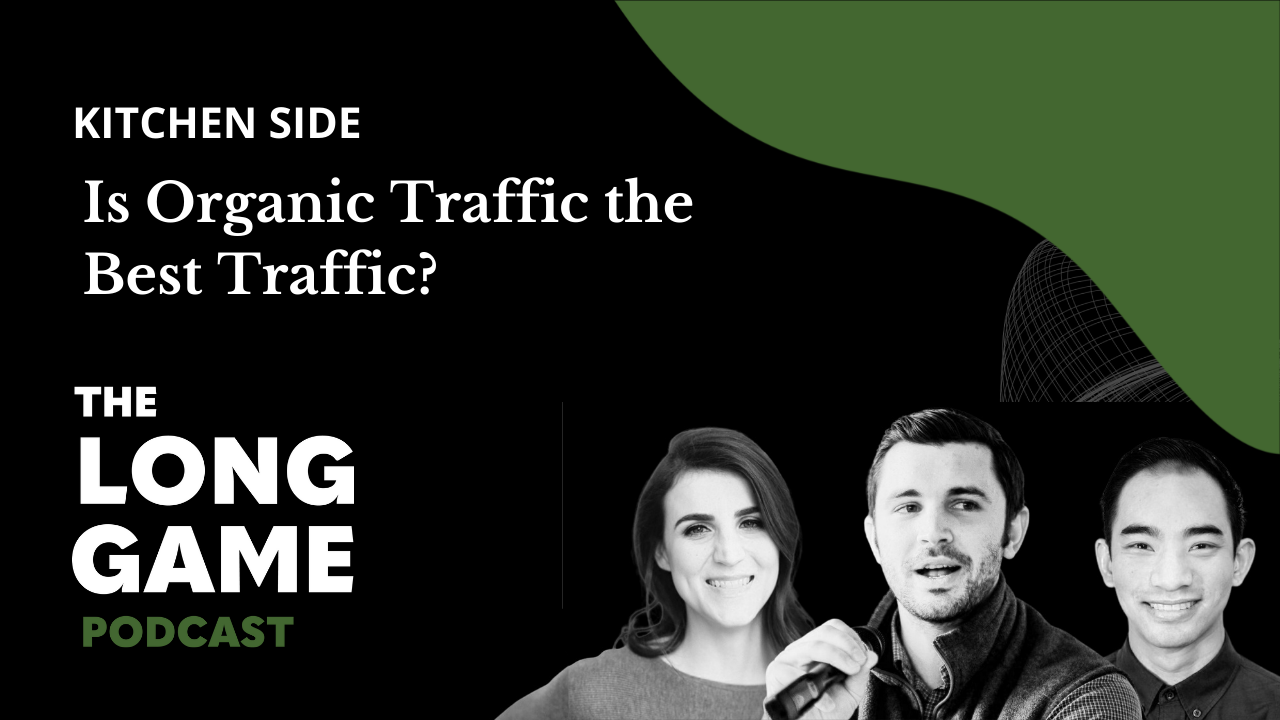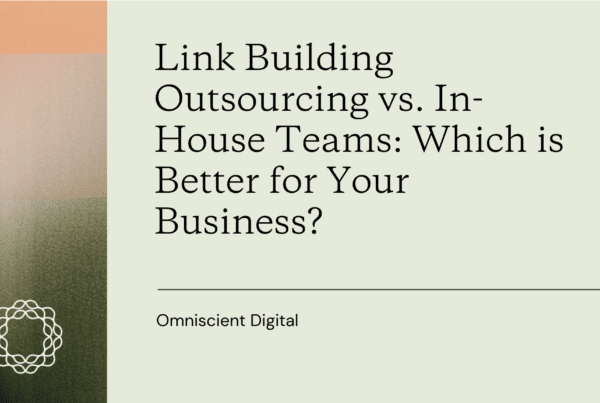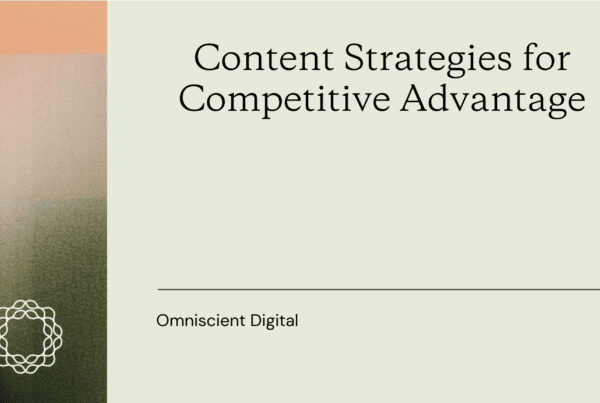
There are many ways to drive traffic to your website. Organic, direct, paid, referral, social—each has a place and purpose in the greater marketing scheme.
Organic traffic has long been held up as the “best” type of traffic. The truth? It depends. All too often organic traffic is driven by surface-level content that doesn’t actually convert customers.
In this episode, as part of our Kitchen Side series where we take you behind the scenes at our agency, the Omniscient team debates the value of organic traffic. We discuss why keyword search volume is overrated, the value of differentiating in a new space, and how your tactics should change along with your company goals.
Connect with Alex on Twitter or LinkedIn
Connect with Allie on Twitter or LinkedIn
Connect with David on Twitter or LinkedIn
Listen to the podcast
Watch the video
Key Takeaways
3:40 – Direct traffic is the highest intent
Alex believes that while organic traffic is buildable and predictable, the most valuable traffic is direct, as those are visitors you’ve gained true traction with.
“I think that organic traffic is probably the best for most companies, because it’s predictable and because you can build it up over time. But best you have to qualify what best means, you have to define that. Because best doesn’t mean the highest intent. I think direct traffic is the best in that sense. Also, by the way, there’s email traffic. So that’s different than direct and it’s different than referral, but it’s still owned. And I would still push it into the direct temperature category. So I think your goal as a content marketer, whichever other channels you use to build up your audience, your goal should actually be to build the direct. Because that implicitly says that more and more people are interested in going to you for your expertise and your knowledge. And if you’re not growing that, you’re probably just getting a bunch of low-fit audience. If you’re not accumulating an email list, if you’re not having more and more people type, beomniscient.com into the search bar, I just think your efforts are probably not hitting. You’re not getting traction with the audience that you should.”
4:48 – Organic traffic isn’t always relevant
David said that organic traffic is sometimes relevant and valuable, and sometimes it’s not. It’s easy for organic traffic sources to be surface-level material that is not directly related to your product or service.
“Direct traffic in general may be the best traffic, because people are going directly to you for whatever reason, or people are sharing your stuff with other people. And organic traffic is more of a ‘it depends.’ Because in my experience, a lot of folks will end up trying to grow organic traffic, but it ends up being really trash traffic. If you can get organic relevant traffic, then that’s the best traffic. Because they’re looking for what you’re selling, or stuff that’s related to what you’re selling. Versus if you’re writing about motivational quotes and you’re selling software, no one cares about your software. But if you’re a media company and you’re writing about motivational quotes and you’re getting paid from advertisers based on views, 100%. It doesn’t matter what views you’re getting, if it’s organic that’s great.”
7:23 – Organic “billboards” don’t always convert
Allie said that some companies have the equivalent of a big billboard online: an item that tops the organic SERPs, driving lots of organic traffic but few actual conversions.
“We just saw this happen with a client where they had this really low intent. It was random, but it was very like low-hanging fruit. They wrote the piece like four years ago. And it contributed a ton of traffic over the last few years, and this year it started to decline. And it offset all our efforts and what we were doing. And they were like, should we rewrite that piece? Should we update it? And I’m like, not before we do what we’re doing. Maybe later, it might be helpful to somebody. But it certainly shouldn’t be a priority. Even though the traffic is showing it, in that sense organic traffic, that’s not valuable to the business even though it looks really good. And I think that’s the inherent danger with chasing organic traffic, is it in and of itself could be a vanity metric. It doesn’t always lead to new business.”
8:26 – Base your strategy on company size and goals
David said that if you have a big budget, by all means pursue “billboard” content so that your company name sticks in customers’ minds. But if you’re smaller, stick to content that’s relevant.
“I think it comes down to the company size, the goals, the level of content maturity, and the resources available. If you have all the writers in the world that you can pay. Yeah. All that content – rank for all those keywords that are low intent. But hey, you have a billboard where people just end up going on your website, and like maybe eventually they are looking for your software five years down the line. But if you’re a small company with limited resources, then you probably shouldn’t be writing that low intent stuff. You should write stuff that’s relevant, and grow traffic that’s relevant to the topics that your audience is really interested in that will lead to product usage.”
9:37 – Be wary of prioritizing by search volume
Alex said that keyword search volume data can be misleading and competitive. Don’t get too fixated on volume or vanity metrics.
“Prioritizing by search volume also has a lot of inherent problems. One being that they’re highly competitive, and sometimes that data’s misleading. I just went after a keyword on my own blog, it’s like ‘landing page optimization tools.’ Ahrefs says that it gets like 1500 searches a month. I ranked number one for it, feature snippet and everything. I get like 15 hits a month. So it can be wrong data. And that data, everybody else is looking at it too. So that means everybody else is competing for it. So even if it’s right, it’s going to be very competitive. And often these terms are very high level and high top of funnel. So prioritizing purely by content volume, you’re going to get into this swamp of competition. And it may also not contribute to the bottom line…There just needs to be architecture and KPI setting that sets guardrails, so you’re not misled by vanity metrics.”
12:42 – Differentiate with relevant keywords
Alex said that instead of going after popular or broad keywords, it’s much smarter to target specific keywords that relate to your audience’s pain points.
“There’s an inherent unfairness in the content world in that the bigger your domain rating is, the more weighty your website is, the crappier your content can be and get away with it and you can still rank. So when it comes down to these competitive keywords with a lot of traffic, the only ones that can feasibly rank are the top-level domain ratings anyway. So if you’re coming in as a new site, you simply shouldn’t go after those unless you’ve got some five-year time horizon, and like this crazy strategic edge that you can exploit to get to those keywords. But even then ask yourself, if 100,000 people are searching for this, how many are actually going to go in and buy based on a keyword that’s ‘what is content marketing’ or something like that, versus something more specific that may have 20 searches, or none, that’s very specific to a pain point that your audience actually has and that you have a chance to compete for and that you can differentiate on. As a smaller company, I would go for those all day.”
13:52 – Create demand vs. meet demand
Allie said that for companies in a new space, the goal isn’t to meet existing demand, it’s to create new demand. That’s when things like keyword volume get even less important.
“The typical process is to identify keywords that are ranking high and drive traffic in that sense. But that essentially meets people where they already are. And there’s value in that. But if you’re playing in a new space, if you’re leading with a thought leadership-based content strategy, revolving your entire process around keywords can be a little disheartening when you’re trying to create demand versus meet it. And in that sense, I’ve seen it time and time again with clients and other people. They’re like, ‘oh, we have these ideas for all these keywords.’ And then we do the research on the volume and the potency of those, and there’s not a lot of volume. And they’re like, ‘oh, nevermind.’ I’m like, wait a second though. These are great topics. These are great stories to tell, super high intent. Maybe it’s your brand versus a competitor, and there’s just not a lot of volume there. That’s still content that’s worth creating. But the thing about getting traffic is a lot of it is about expectation setting, and playing the long game.”
16:47 – Keyword research is audience research
Allie said that the whole purpose of keywords is to speak to what matters to your audience. When you’re charting new territory, those might be new and innovative topics that don’t have an existing place in the keyword universe.
“Keyword research is audience research. You’re essentially trying to understand what your audience cares about, what they’re curious about, what they want to learn, what they want to know. And then how you can answer them, how you can essentially build trust and hopefully convert them. But you’re working within a realm that’s already been established, which is where a lot of that competition comes from. But if you’re playing in a new space, if you have all these really new ideas, I find people limit themselves based on keyword research. And I’m like, no, keep going. Create a new space. Corner that part of the SERP. And it might not drive traffic for years, but guess what? One day when this becomes a commonplace term, you’re there. You’re already ranking.”
18:46 – Build a keyword mansion, not a shack
Allie said that your website should be a true destination. It’s not enough to “claim” space with keywords in a halfhearted way. You need to go all-in with valuable content so that you drive direct traffic versus organic.
“Keywords are super valuable. It’s like laying the foundation for a house. You find this great plot of land that has lots of potential, and some people just build a shack on it. Just to create. You’re like, oh, I own this space. I have a piece on the term. But the right way to do it would be building a mansion, or building something that people want to come in and they want to stay there. You want your site to be a destination, not just like a stopover. I guess there is some value in answering a question, helping somebody. Like a recipe site – can you imagine the organic traffic on a recipe site, but there’s really nothing that comes from that. And that’s obviously done intentionally. But like for software, for content written to convert, there’s a whole different approach to it. And sometimes organic traffic is not the best way to do it. And I think that it’s going to become less and less valuable traffic in my opinion, unless Google continues to like prune things.”
31:52 – Balance paid and organic channels
Alex said that diversification is the key. That’s because over time, the value of paid customer acquisition decreases while the value of organic traffic increases.
“I think over the course of the company’s growth, you will want some sort of organic or non-paid channel. Paid tends to have diminishing marginal utility over time, because the things you’re bidding on get more competitive, more competitors outbid you. The cost to acquire customers becomes more and more expensive, but the opposite is true of organic. It becomes easier and easier. And your marginal cost to acquire customers becomes less. And often the two kind of synergize. So if you’re ranking in search, that’s actually going to help you with your Google ads. So I think building out and also diversifying your channels so you’re not fully reliant on one ad platform, where if their bidding algorithms change or whatever you’re completely fucked. So I think over the course of your company’s future, you should look into diversifying. But it definitely depends on your company stage and industry and goals.”
Connect with Omniscient Digital on social:
Twitter: @beomniscient
Linkedin: Be Omniscient
Listen to more episodes of The Long Game podcast here: https://beomniscient.com/podcast/


